- Clone
- 17B5 (See other available formats)
- Regulatory Status
- RUO
- Other Names
- 4-1BB, TNFRSF9, Ly-63, ILA (Induced by Lymphocyte Activation), CD137
- Isotype
- Syrian Hamster IgG
- Ave. Rating
- Submit a Review
- Product Citations
- publications
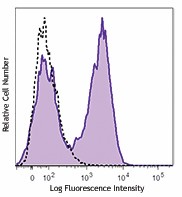
-

ConA+IL-2 (3 days) stimulated C57BL/6 splenocytes were stained with CD137 (clone 17B5) APC (filled histogram) or Syrian Hamster IgG APC (open histogram).
| Cat # | Size | Price | Quantity Check Availability | Save | ||
|---|---|---|---|---|---|---|
| 106109 | 25 µg | $113 | ||||
| 106110 | 100 µg | $291 | ||||
CD137 is a 39 kD TNF-receptor superfamily member also known as 4-1BB, TNFRSF9, Ly-63, and ILA (Induced by Lymphocyte Activation). CD137 is expressed as monomers, dimers, and tetramers on activated T and B cells. Interaction of CD137 with its ligand, 4-1BBL (CD137L), is important in T-B cell costimulation. The 17B5 antibody has been reported to block 4-1BBL costimulated T cell proliferation.
Product DetailsProduct Details
- Verified Reactivity
- Mouse
- Antibody Type
- Monoclonal
- Host Species
- Syrian Hamster
- Formulation
- Phosphate-buffered solution, pH 7.2, containing 0.09% sodium azide.
- Preparation
- The antibody was purified by affinity chromatography and conjugated with APC under optimal conditions.
- Concentration
- 0.2 mg/ml
- Storage & Handling
- The antibody solution should be stored undiluted between 2°C and 8°C, and protected from prolonged exposure to light. Do not freeze.
- Application
-
FC - Quality tested
- Recommended Usage
-
Each lot of this antibody is quality control tested by immunofluorescent staining with flow cytometric analysis. For flow cytometric staining, the suggested use of this reagent is ≤0.5 µg per million cells in 100 µl volume. It is recommended that the reagent be titrated for optimal performance for each application.
- Excitation Laser
-
Red Laser (633 nm)
- Application Notes
-
Additional reported applications (for the relevant formats) include: in vitro blocking of 4-1BB-mediated T cell proliferation2. The LEAF™ purified antibody (Endotoxin <0.1 EU/µg, Azide-Free, 0.2 µm filtered) is recommended for functional assays (Cat. No. 106108).
-
Application References
(PubMed link indicates BioLegend citation) - Product Citations
-
- RRID
-
AB_2564296 (BioLegend Cat. No. 106109)
AB_2564297 (BioLegend Cat. No. 106110)
- Disclaimer
-
This product may be used for research purposes only. It is not licensed for resale and may only be used by the buyer. This product may not be used and is not licensed for clinical assays where the results of such assays are provided as a diagnostic service. If a diagnostic or therapeutic use is anticipated then a license must be requested from the University of California. The availability of such diagnostic and therapeutic use license(s) cannot be guaranteed from the University of California.
Antigen Details
- Structure
- TNF-R superfamily, 39 kD
- Distribution
-
Activated T cells and B cells
- Function
- T-B cell costimulation
- Ligand/Receptor
- 4-1BB ligand (CDw137L)
- Cell Type
- B cells, T cells, Tregs
- Biology Area
- Costimulatory Molecules, Immunology
- Molecular Family
- CD Molecules
- Antigen References
-
1. Barclay A, et al. 1997. The Leukocyte Antigen FactsBook Academic Press.
2. Alderson MR, et al. 1994. Eur. J. Immunol. 24:2219.
3. Schwarz H, et al. 1996. Blood 87:2839. - Gene ID
- 21942 View all products for this Gene ID
- UniProt
- View information about CD137 on UniProt.org
Other Formats
View All CD137 Reagents Request Custom Conjugation| Description | Clone | Applications |
|---|---|---|
| Biotin anti-mouse CD137 | 17B5 | FC |
| PE anti-mouse CD137 | 17B5 | FC |
| APC anti-mouse CD137 | 17B5 | FC |
| TotalSeq™-A0194 anti-mouse CD137 | 17B5 | PG |
| Ultra-LEAF™ Purified anti-mouse CD137 | 17B5 | FC,Block |
| TotalSeq™-C0194 anti-mouse CD137 | 17B5 | PG |
| TotalSeq™-B0194 anti-mouse CD137 | 17B5 | PG |
| PE/Cyanine5 anti-mouse CD137 | 17B5 | FC |
Customers Also Purchased
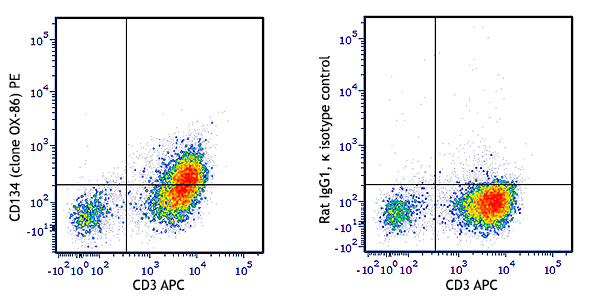
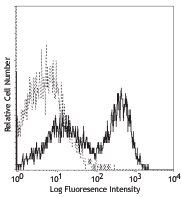
Compare Data Across All Formats
This data display is provided for general comparisons between formats.
Your actual data may vary due to variations in samples, target cells, instruments and their settings, staining conditions, and other factors.
If you need assistance with selecting the best format contact our expert technical support team.
-
Biotin anti-mouse CD137
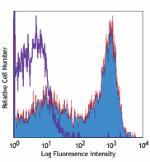
Con A-stimulated BALB/c mouse splenocytes stained with bioti... -
PE anti-mouse CD137
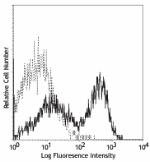
Con A-stimulated (3 days) splenocytes stained with 17B5 PE -
APC anti-mouse CD137
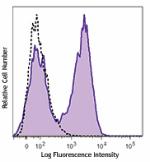
ConA+IL-2 (3 days) stimulated C57BL/6 splenocytes were stain... -
TotalSeq™-A0194 anti-mouse CD137
-
Ultra-LEAF™ Purified anti-mouse CD137
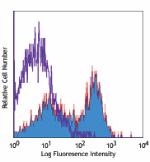
Con A-stimulated BALB/c mouse splenocytes stained with Ultra... -
TotalSeq™-C0194 anti-mouse CD137
-
TotalSeq™-B0194 anti-mouse CD137
-
PE/Cyanine5 anti-mouse CD137

Con A + IL-2 stimulated (3 days) C57BL/6 splenocytes were st...
 Login/Register
Login/Register 















Follow Us